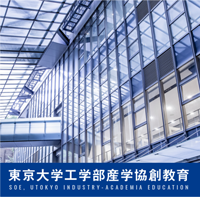Society
Index
Society
Department of Civil Engineering
The Department of Civil Engineering aims to nurture talented individuals capable of accurately discovering, diagnosing, and resolving social problems, and presenting futuristic visions for national territories, regions, and cities. To that end, we first offer various lectures concerning fundamental theories to understand social systems, consensus building techniques related to socioeconomic infrastructure investment, public management strategies to achieve futuristic visions, policies to properly introduce and operate social systems and regulations, and the like. With the aim of developing sense and technology for the advanced planning and management of cities and regions we also offer a number of exercises that use precedents. Furthermore, as concerns research projects for graduation, we offer research guidance under the theme of concrete social problems, mainly through management, cities and transportation, and international project research groups.
Department of Urban Engineering
To think deeply about cities is to think broadly about our society.
In the Department of Urban Engineering, the essence of an issue is identified in contrast with the complex urban and environmental issues associated with the diverse social situations in modern societies such as aging societies with decreasing birthrates, low carbon societies, information societies, international societies, stratified societies and the like, and the distinctive curriculum we offer consists of lectures by experts in specialized fields and integrated interdisciplinary exercises in order to master the systematic knowledge and skills for devising, selecting, and implementing multiple methods for resolving such issues.
We nurture a wide range of talented individuals, from city specialists to social generalists, who have acquired the ability to recognize, analyze, conceive and create cities through integrated exercises that teach concrete planning techniques, observation of town planning meetings that include civic participation, engineering ethics education related to urban engineering and the like on various scales such as wide regions, cities, and communities.
Department of Mechano-Informatics
Urban functions, enterprises, administrations, services and the like are integrated systems that connect people, activities and infrastructures with information, make decisions, and produce action and can be regarded as large intelligent robot systems. In this way, the idea of creating new value or improving efficiency by integrating and designing an entire social system as an intelligent information system known as "social ICT". In manufacturing, as opposed to providing advanced technology itself, this means designing an entire system integrated with actual user values and an easy-to-use mechanism. The Department of Mechano-Informatics promotes education and research on systems in which the real world, people, and information form a triad. Although robots are a typical example, we address social ICT as a new development. In addition to a basic education in the three fields mentioned above, we also promote research to realize social system transformation through close collaboration with industries, business circles, administrations, overseas entities and the like. These offer a wealth of opportunities for students to gain a global perspective and come into contact with various communities in the real world.
Department of Aeronautics and Astronautics
Aircraft as a means of high-speed transportation and spacecraft for communication, observation and the like are essential technology for modern society. In addition to contributing to improving our standard of living, the aerospace industry is expected to be a leading driving force for Japan’s manufacturing industry. Technically, aerospace is a synthesis of many fields and is promoted under global competition and cooperation. It is implemented in society under a credible system to ensure safety and reliability. To that end, we collaborate with domestic and international companies, administrative agencies and research institutes to conduct research that can contribute to society such as in promoting industrialization, solving environmental problems, alleviating congested air routes and airports and the like. Furthermore, we not only conduct research, but also foster the development of talented individuals in the aerospace field capable of playing a broad range of active roles in governments and industries around the globe.
Department of Information and Communication Engineering
Information and communications technology is becoming a general purpose technology. As opposed to relating to specific products, technology it is used in varied economic activities and is relevant to a very wide range of fields. In other words, technology has the power to fundamentally change industries including environmental, urban, agriculture, resources, distribution, civil engineering, medicine and education, and it also has the power to greatly change industrial, economic, and social structures. In an extreme case, the ultimate goal for information and communication technology is to build a new nation that enables sustainable growth. Keeping in mind that the present world is transient, the mission of the Department of Information and Communication Engineering includes aiming to establish new industry, social systems and technology.
Department of Electrical and Electronics Engineering
The Great East Japan Earthquake made mankind keenly aware of the importance of energy and information networks. If society as a whole is compared to the human body, the energy network corresponds to the circulatory system, and the information network corresponds to the neural network. Consequently, energy and information networks are essential components in a sustainable society. In collaboration with the Department of Information and Communication Engineering, the Department of Electrical and Electronics Engineering promotes education and research to preserve the robust condition of, and further develop, energy and information networks. For instance, students can learn the relationships of various technologies to society, institutions, and policies while studying about a safe, secure and affluent aged society and state-of-the-art smart grid technology that brings about a low-carbon society through the integral use of information and energy networks.
Department of Mathematical Engineering and Information Physics
Pursue ‘universal principles and methodology’! These are the basis of science and technology. This is the goal of the Department of Mathematical Engineering and Information Physics. Researching this ‘universal principles and methodology’ is indivisible from research in individual fields, and in the Department of Mathematical Engineering and Information Physics research in various fields is conducted along with researching the ‘universal principles and methodology’.
Examples related to “society” include the development of time series analysis methods and numerical calculation methods for financial engineering, the development of discovery methods for relationships lurking in social networks, the mathematical modeling of the propagation of infectious diseases and the like, and the construction of glocal control system theories that integrate measurement, prediction to realize a “sustainable social system”. In the department curriculum, students acquire ‘universal principles and methodology’ basics in lectures, develop principles and methodologies through research for graduation, and engage in resolving practical issues.
Department of Chemical System Engineering
In the Department of Chemical System Engineering it is possible to analyze and control chemical phenomenon with scales from molecular to global in size, and with a focus on the systemization and design of these components, a chemical system engineering methodology can be acquired.
In this department, the approach to issues related to various social designs is multifaceted, ranging from global scale issues such as global warming, desertification, life cycle assessment and the medical system, to problems at the atomic and molecular level. Chemical system engineering and advanced expertise and technology support that. The curriculum in this department allows for the acquisition of chemical system engineering and advanced expertise, and one can develop as a ‘specialist and generalist’ who has a well-balanced view of the parts and the whole.
Department of Systems Innovation
Modern societies are complex, highly intelligent and informed, and are tangled with a variety of complex social issues such as environmental and energy issues, North-South divide issues, food issues, financial issues and the like. In other words, there is a demand in modern society for talented individuals capable of conducting scientific analysis, and creating industries and making policies for the resolution of complex issues.
The Department of Systems Innovation trains talented individuals to become management and policy elite (executive engineers) that bridge the sciences and liberal who are capable of designing an appealing society. To that end, we not only provide a conventional engineering education that covers dynamics, design and programming, but our academic program also offers a good balance of subjects such as corporate management, economics and the like, and provide small-group project practice exercises that correspond with problems in the real world.



